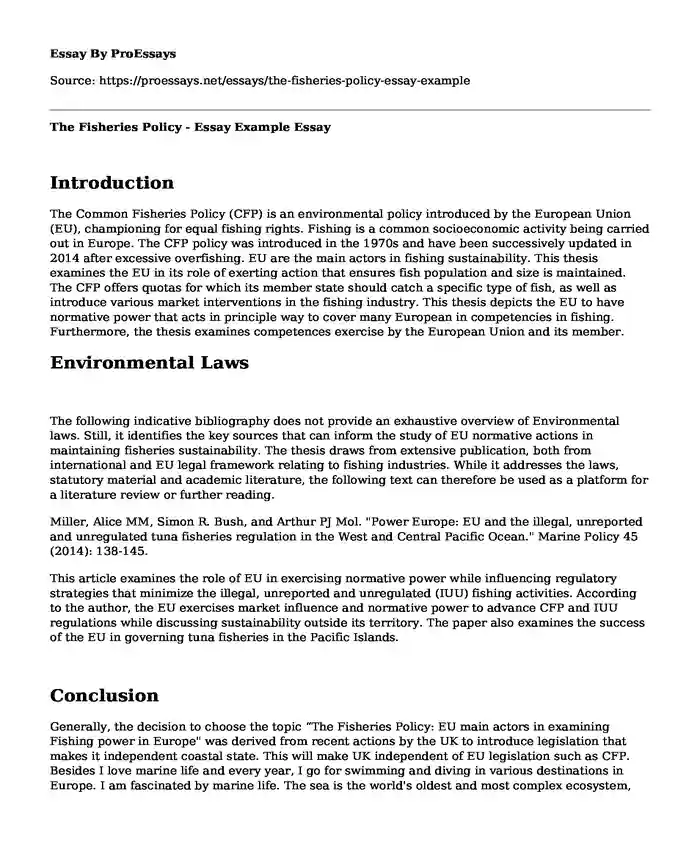Introduction
The Common Fisheries Policy (CFP) is an environmental policy introduced by the European Union (EU), championing for equal fishing rights. Fishing is a common socioeconomic activity being carried out in Europe. The CFP policy was introduced in the 1970s and have been successively updated in 2014 after excessive overfishing. EU are the main actors in fishing sustainability. This thesis examines the EU in its role of exerting action that ensures fish population and size is maintained. The CFP offers quotas for which its member state should catch a specific type of fish, as well as introduce various market interventions in the fishing industry. This thesis depicts the EU to have normative power that acts in principle way to cover many European in competencies in fishing. Furthermore, the thesis examines competences exercise by the European Union and its member.
Environmental Laws
The following indicative bibliography does not provide an exhaustive overview of Environmental laws. Still, it identifies the key sources that can inform the study of EU normative actions in maintaining fisheries sustainability. The thesis draws from extensive publication, both from international and EU legal framework relating to fishing industries. While it addresses the laws, statutory material and academic literature, the following text can therefore be used as a platform for a literature review or further reading.
Miller, Alice MM, Simon R. Bush, and Arthur PJ Mol. "Power Europe: EU and the illegal, unreported and unregulated tuna fisheries regulation in the West and Central Pacific Ocean." Marine Policy 45 (2014): 138-145.
This article examines the role of EU in exercising normative power while influencing regulatory strategies that minimize the illegal, unreported and unregulated (IUU) fishing activities. According to the author, the EU exercises market influence and normative power to advance CFP and IUU regulations while discussing sustainability outside its territory. The paper also examines the success of the EU in governing tuna fisheries in the Pacific Islands.
Conclusion
Generally, the decision to choose the topic “The Fisheries Policy: EU main actors in examining Fishing power in Europe" was derived from recent actions by the UK to introduce legislation that makes it independent coastal state. This will make UK independent of EU legislation such as CFP. Besides I love marine life and every year, I go for swimming and diving in various destinations in Europe. I am fascinated by marine life. The sea is the world's oldest and most complex ecosystem, which in my mind is reason enough to want to understand sustainability issues that might impact sea animals. I have also worked in a National Sea Sanctuary, and often, scuba divers could report of decreasing types of fish species. Besides, the waste and rubbish affecting the marine species and their habitats have encouraged me to explore ways countries are acting to save marine life. Besides, my parents have an avid interest in aquaculture and Fishery Management, and I would like to study this topic on a deeper scale and have an insight that I might contribute to their work.
Cite this page
The Fisheries Policy - Essay Example. (2024, Jan 11). Retrieved from https://proessays.net/essays/the-fisheries-policy-essay-example
If you are the original author of this essay and no longer wish to have it published on the ProEssays website, please click below to request its removal:
- Critique of China's Mobile Payments: Essay Sample
- Causes of Illegal Immigration Essay
- Citation Activity on The Rich Get Richer, and the Poor Get Robbed: Inequality in U.S. Criminal Victimization
- The Impact of Raising Minimum Wage on the United States Economy Essay
- Essay Sample on Law Explanation: The Fourth Amendment of the US Constitution
- Research Paper Sample on Collective Labor Rights
- A Satirical Proposal: Redefining Solutions to Poverty in the United States - Paper Example







